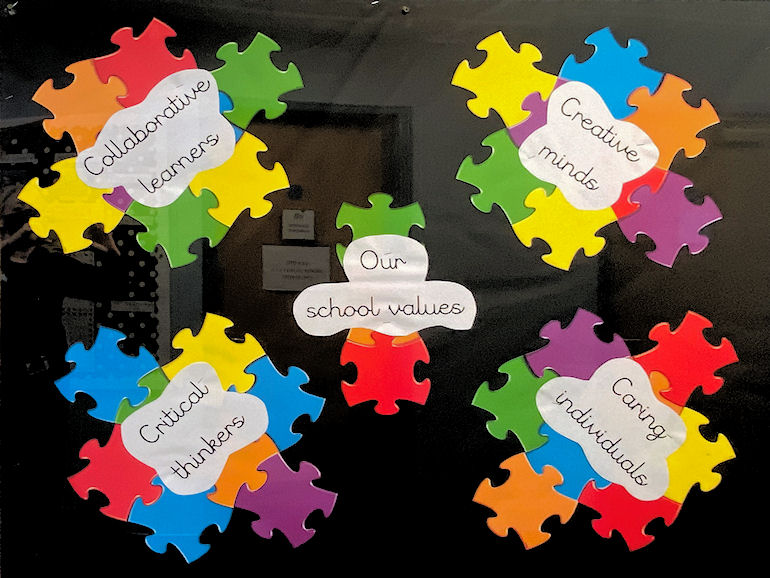Our Values
Core Values
Our shared core values arose out of what we believe to be important about people, about society and about learning and knowledge. Core values have a range of differing dimensions and are particularly related to citizenship issues, spiritual, moral, social and cultural development of pupils and learning to learn:
- Learning as a lifelong process: critical curiosity, making connections, challenge, making meaning.
- Spirituality: developing self-awareness, awareness of others awareness of the world around us, and for some, awareness of a God.
- Morality: commitment to living and behaving in certain ways.
- Social development: co-operation and emotional literacy.
- Cultural development: empathy and valuing difference.
- Personal development: self esteem, self efficacy, motivation for learning.

Our Values
We are proud to be a gold ‘Philosophy for Children (P4C)’ school and have embedded the values associated with P4C. They are the golden threads which run throughout our curriculum which is everything we do at New Hall, from assemblies to lessons to visits and relationships.
At New Hall, the ambition for all is to love to learn for life. Our values are the golden threads of our Curriculum. We want our pupils to become:
- Critical Thinkers: questioning, checking and challenging
- Collaborative Learners: responding, supporting, building on and joining in
- Creative Minds: connecting and comparing ideas and exploring possibilities
- Caring Individuals: thinking, listening, empathising and respecting others.
British Values
New Hall Primary serves a richly diverse community, and we take our responsibility to promote community cohesion, cultural capital, diversity to generate a respect for difference and individual rights seriously.
A key part of our plan is to ensure children become valuable and fully rounded members of society who treat others with respect and tolerance, regardless of background. This ensures young people understand the importance of respect and leave school fully prepared for life in modern Britain.
British Values are:
- democracy,
- the rule of law,
- individual liberty
- mutual respect and tolerance for those of different faiths and beliefs.
Pupils are expected to learn:
- an understanding of how citizens can influence decision-making through the democratic process, by applying for positions in school such as Prefects and Librarians, Peer Mediators and Play Leaders.
- an understanding that the freedom to hold other faiths and beliefs is protected in law
- an acceptance that people having different faiths or beliefs to oneself (or having none) should be accepted and tolerated, and should not be the cause of prejudicial or discriminatory behaviour through our RE curriculum
- an understanding of the importance of identifying and combatting discrimination through pupil voice.
Examples of how we promote British values include:
Democracy
- Ensuring that our children develop knowledge of, and respect for, public institutions and services, eg. visits to/from Police, Fire Service.
- Teaching our children how they can influence decision making through the democratic process through class voting, assemblies and activities during times of elections (local/general).
- Pupils have further opportunity to have their voices heard through our School Council. The elections of School Council, Head Boy and Girl and are the result of pupil votes and all of these groups canvas the opinions of their peers.
- Democracy is promoted in EYFS through ‘choice’ and circle time activities.
- In KS1 Democracy is promoted through Philosophy for Children (P4C).
- In KS2 Democracy is promoted through the pupils expressing their views through Philosophy for Education (P4C).
The Rule of Law
- Ensuring school rules are clear and fair, eg. through our consistent Behaviour policy.
- Helping children to distinguish right from wrong,
- Promoting respect for the law and the basis on which it is made, eg. through visitors such as PCSOs, Police, and MP into school.
- Helping children to understand that living under the rule of law protects individuals, eg. through our RE curriculum and visitors.
Individual Liberty
- Encouraging and supporting pupils in developing their self-knowledge, self-esteem and self-confidence through our ethos, our way of treating people, investing in meeting the needs of all children, providing equality of opportunity, and understanding the needs of all children.
- Encouraging pupils to take responsibility for their behaviour as well as knowing their rights, through linking rights with responsibilities and having a fair and consistent Behaviour Policy.
- Challenging stereotypes with welcoming visitors into school to talk about disability awareness, anti-racism and a high profile anti–bullying week.
- Implementing a strong anti-bullying culture.
Respect and Tolerance
- Promoting respect for individual differences through our ethos, RE curriculum, P4C philosophy and also through Assemblies.
- Helping children to understand and respect their own and other cultures and ways of life, through RE, Geography, International Links.
- Discussing and celebrating the differences between people such as differences of faith, ethnicity, disability, gender and different family situations such as being a looked after child or a young carer.

